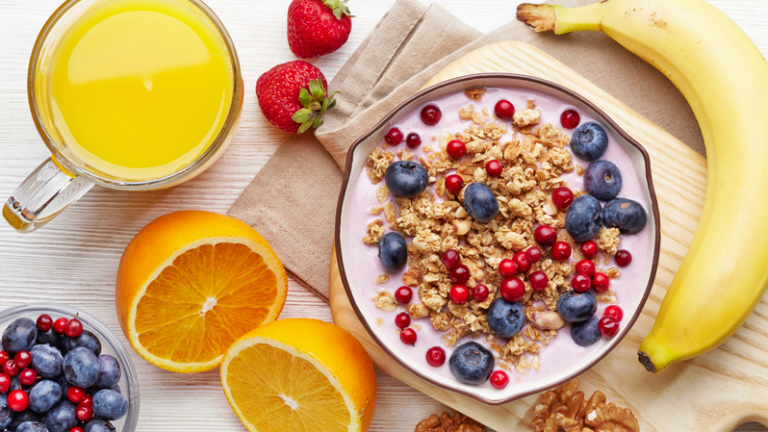You’ve heard it since grade school — breakfast is the most important meal of the day! However, we are a society constantly on the go, making it not only difficult to have time for breakfast, but also to eat the foods that will benefit our active lifestyle the most. Breakfast could be the key to more success in your health and fitness goals!
Let’s first discuss why breakfast is so important for the fitness-minded individual. Then, let’s discover the best foods to make part of your daily routine.
Why Should I Eat Breakfast?
The amount of research that points to the importance of eating breakfast over any other meal is overwhelming. In fact, I don’t think many experts would recommend that we should skip breakfast or a meal during the day. Breakfast can be the difference between having the energy to get through the day or not. For the fitness individual, it can also be the difference in achieving your health and fitness goals.
Increases Weight Loss
Some people skip breakfast with the thought that the reduced calorie intake will help with weight loss. However, this may not be wise. Research has shown that those who eat breakfast tend to be thinner.
In fact, 78% of successful dieters, defined as those who have lost more than 10% of their body weight and kept it off for two years, reported eating breakfast every day.
Bottomline is that people who start the day with a healthy meal are less susceptible to midday food cravings. And fewer food cravings means less tendency to snack on foods that are high in fats and sugars.
However, how much you eat for breakfast is important as well. Too many calories in the morning can also lead to overeating throughout the day and reduce the chances of weight loss. So remember to eat in moderation and track your overall calories.
Increases Memory and Focus
According to a review in 2005 by the Journal of the American Dietetic Association, eating breakfast improves your cognitive function, the ability for reasoning and processing information, as well as its capacity to focus and remember information. Cognitive function improves after eating any food. Therefore, breakfast should contain a healthy blend of carbohydrates, fats, and proteins to help your brain the most. With increased focus during your morning workout, your body can move more efficiently through dynamic exercises.
Boosts Energy Levels
Breakfast healthfully increases our metabolism at the start of each day. Blood sugar is required to maintain your muscles and brain function. When we are sleeping, our blood sugar levels drop. Just like a car cannot move with an empty gas tank, there is no fuel for your body to perform.
Eating breakfast raises your blood sugar levels and stabilizes your bodies normal rhythm. Breakfast gives your brain and muscles the necessary energy to tackle that morning workout and helps maintain your ability to make it through the rest of the day.
Keep Diseases Away
Lastly, research has shown that individuals who eat breakfast are less likely to develop heart disease and Type 2 Diabetes.
For people with Type 2 Diabetes, breakfast is a critical meal at the start of the day. The morning meal also plays a role in preventing diabetes. Eating breakfast helps to improve the bodies insulin sensitivity and maintain blood sugar levels. Breakfast foods that have a low glycemic index will assist in preventing a spike in blood sugar throughout the morning and possibly well into the afternoon.
When people do eat breakfast daily, they are also less likely to have risk factors associated with heart disease like high cholesterol and elevated blood pressure.
Simply put, a daily breakfast with the correct food choices reduces health risks, gives you the energy to keep working out in the gym, and progresses you toward your health and fitness goals.
What Should I Be Eating for Breakfast?
If you’re in a rush in the morning, you may be tempted to just grab a doughnut and coffee on the way out the door. Sure, the extra sugar and caffeine will get you started, but eating these foods for breakfast will lead to almost the same effect as not eating breakfast at all! In less than a couple hours, you will be left feeling hungry and may experience a sugar crash. The result for many is resorting to foods that are higher in fats and sugars to try to fill themselves up the rest of the day.
Instead, start your day with a bottle of water and foods that are rich in vitamins and nutrients. Foods with carbohydrates give you energy now. Protein rich foods give you energy later. Foods with fiber keep you feeling full throughout the day.
That means you should be looking for breakfast from dairy, grains, and fruits, not from foods that are high in fat and sugar such as pancakes and waffles, toaster pastries, muffins and fried foods. In regards to portion sizes, you should feel about 80% full. If you’re unsure whether your breakfast is healthy, check with your nutritionist who will be able to give you valuable advice.
7 Recommended Breakfast Foods:
1. Cottage Cheese
Not what I would normally consider a breakfast food, but cottage cheese is high in protein. It effectively increases your metabolic rate and promotes the feeling of fullness by reducing the “hunger hormone” ghrelin. Top your cottage cheese with fruit, nuts, chia seeds or flax seeds for an extra nutrient-dense punch.
2. Oatmeal
The healthier version of cereal, oatmeal is rich in beta-glucan fiber, which lowers cholesterol and increases feelings of fullness. Oatmeal is also full of antioxidants that promote a healthy heart and reduce blood pressure.
3. Berries
High in fiber, low in calories, and rich in antioxidants, mixed berries are the perfect topping for Greek yogurt, oatmeal or cottage cheese. Berries are also easy to pre-pack for a quick to-go item on those busy mornings.
4. Greek Yogurt
High in protein, makes you feel more full and may assist with weight loss. Many Greek yogurts will also contain beneficial probiotics, which help your gut stay healthy. Top your Greek yogurt with nuts or berries to gain extra health benefits!
5. Fruit
All fruits are an excellent source of vitamins, potassium and fiber. They also contain antioxidants that can help reduce disease risk. Bottom line, a daily dose of fruits can keep you feeling full, give you energy and keep you healthy.
6. Eggs
High in protein and several other essential nutrients, eggs promote a feeling of fullness which will help you eat fewer calories. I keep a few hard-boiled eggs in the fridge for that morning when I’m in a rush.
7. Nuts
You can feel full on just a handful of nuts. Plus, this nutrient-dense food may help reduce the risk of heart disease and improve your control over your blood sugar levels.
How useful was this post?
Click on a star to rate it!
Average rating 0 / 5. Vote count: 0
No votes so far! Be the first to rate this post.




